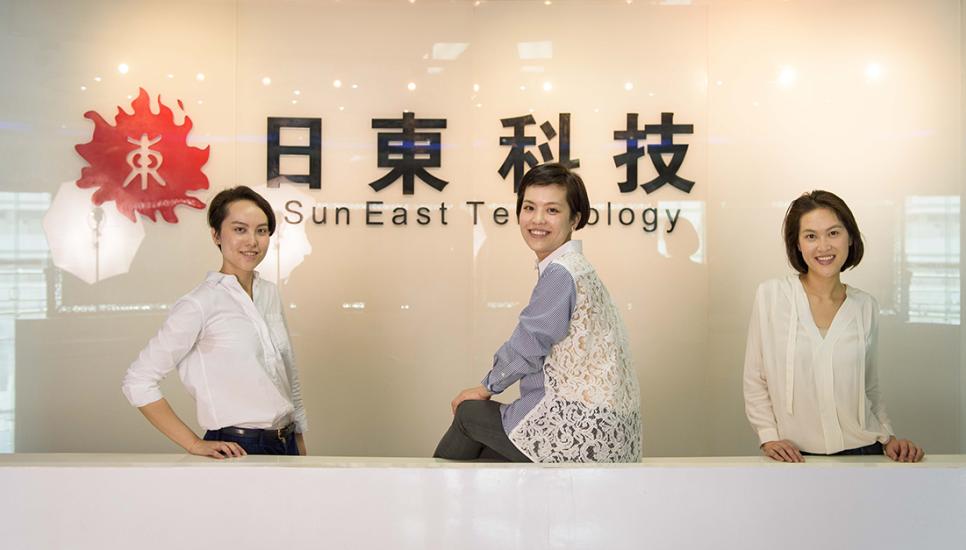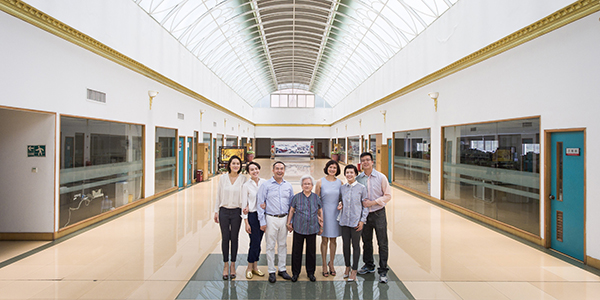Victoria But: The next-gen establishing a forward-thinking family governance structure

While many countries in the West understand the importance of having a clear governance plan, ultra-high-net-worth Asian families tend to be led by the patriarch or matriarch, often with little thought given to family succession [1].
The pioneering But family, however, is taking an open-minded and forward-thinking attitude to this standard by working towards a defined governance plan with a transparent transition. What’s more, the paterfamilias has charged his next-gen daughter with establishing the strategy… An uncommon tactic that is already reaping dividends. Needless to say, Victoria But is not your typical family office principle. Born in Hong Kong and raised in New Zealand, she is the middle child of three daughters and had no particular business aspirations when she was growing up.
However, she flourished in a male-dominated environment in which she was required to adapt to a new culture, learn the language and understand the industry. Having thrived in the family business, Victoria’s father made the astute choice to invite her to sustain and grow their family’s legacy [1] while giving her the chance to establish herself as a shrewd investor in her own right.
“We are only a second-generation family business,” says Victoria. “This generation is all girls, so there are no boys to pass down to. Some people would say to my dad, ‘Why would you ask your daughter to work in the factory?’ For him, it didn’t really matter if we were girls or boys, it was more about who was willing to join the business. He believes that learning all aspects of a business would help me no matter what position or industry I will be in the future. And he was right. You can learn a lot just by walking around the company. You can foresee what kind of problems startups will face as they scale-up.”
[My father] was one of the first generations of Hongkongers who moved the factory into mainland China.
The business in question was Sun East Technology (Holdings) Limited, a tech company established in Hong Kong in the 1980s which found huge success once it made the move to mainland China.
“The family business was started by my dad and his brother and then joined by my other uncles,” says Victoria. “They started on the production line in surface mount technology (SMT). When they went from Hong Kong to China and opened a new factory, that's when the business really grew. After it became listed and, as they moved further overseas into South-East Asia and the Middle East, they expand from SMT into Industry 4.0 of automated production lines, automated warehouses, and robotic arms.
“We’ve been in China for nearly 40 years now. He was one of the first generations of Hongkongers who moved the factory into mainland China.”
Having received her education in New Zealand, Victoria never gave too much thought to joining the business – “I studied food science,” she says. “I didn't even understand what my family business was about!” – but, given the opportunity to become part of a new venture she saw her opportunity to jump on board.
 “I joined the company around ten years ago, when my dad said, ‘We’re starting a project on solar energy, and we have a lot of suppliers from overseas that speak English, so maybe you can help with that.’ I thought it was time to try something new and to learn about my Chinese heritage. As I'm interested in the renewable energy space, I ended up going into the family business.”
“I joined the company around ten years ago, when my dad said, ‘We’re starting a project on solar energy, and we have a lot of suppliers from overseas that speak English, so maybe you can help with that.’ I thought it was time to try something new and to learn about my Chinese heritage. As I'm interested in the renewable energy space, I ended up going into the family business.”
Having made the transition from New Zealand to China and without an extended family support system around her, Victoria freely admits she initially struggled to fit in – “I grew up in a different part of the world, China has a completely different culture. I didn't even really speak Mandarin at the time. There is a Chinese idiom: Nothing in the world is difficult for one who sets their mind to it.” – so she threw herself into her work (learning the language along the way) and quickly discovering what made the business tick.
“I started as a project manager, then got involved in the company marketing and took on other responsibilities that other people probably didn't want to take on,” she laughs. “Looking back, it was good experience at that age to be exposed to such an up-and-coming market and my dad has always told me that there are many opportunities in China but I couldn’t recognise these possibilities until I was in it.
“Later, my uncles decided to sell and the business was bought by a State-Owned Enterprise (SOE). My family stayed on and were still on the board, but then my dad eventually stepped down and started his new venture in health and wellness.”
I discovered how to use my investment to make a positive impact on society.
One successful exit later, in which Sun East Group was sold to the state-owned tech firm Unisplendour Group, Victoria found herself with the freedom to explore her own passion and career.
“I didn't really find my purpose until I came to London. It was there that I discovered how to use my investments to make a positive impact on society. That’s something I'm very passionate about…. I'm seeing the impact I can make while at the same time as making a return.”
Victoria then threw herself into a series of investments (with a particular focus on tackling the root problems of climate change and the food crisis) and pre-initial public offering opportunities, with a view to to finding synergies among her investments, being the bridge between East and West, and only working with people she sees as having “Great integrity and purpose”.
“I never had an idea of starting my own business because it's a very big responsibility,” she says. “But then after meeting these entrepreneurs and being inspired, I wanted to start my own enterprise. I have experience of manufacturing and management, and also the China market, so I'm transferring those resources and knowledge into new tech areas as my dad did when he transferred his experience in textile and food & beverage industries into the tech industry. I can play a more active role in helping tech startups to connect to the Asian market, as well as using the fast-paced manufacturing ecosystem and capacity that we have in China.”
All the while she’s been forging her own path, Victoria has been overseeing the development of the new family office - which is also called Sun East[2] - ensuring that it’s developed with total transparency and communication each step of the way.
“Now, as the principle of the family office, I want to discover more about developing matters like succession, how I can work with my sisters in the future and the direct investments my dad had made in China,” she says.
I would say we are more risk taking as a second generation - usually the first generation is more adventurous!
While there has been a huge rise in Asian family offices, with 40% set up post-2010 [2], there is still a great deal of discomfort around discussions of succession planning. Two in five Asian family offices feel uneasy discussing the sensitive topic [3], but there are no such difficulties for the But family, with Victoria leading the conversation about the family charter and plans for the next generation and beyond.
“I would say we are more risk taking as a second generation - usually the first generation is more adventurous!” she says. “That’s something that we get from both of our parents, never stop learning and always stay positive and open-minded to be inspired by new things, people and the cultural differences around us. We were fortunate to have the freedom and space for us to pave our own path while, at the same time, knowing to be perseverant when we believe it’s right - that’s the legacy I want to pass on. This is why we wanted to set up the family office, as a way of handing down knowledge and wisdom from our previous generations.”
“We see the western and Japanese system of family offices as a way to pass on the wealth for many generations. In China, we are starting to learn from the experience of other cultures and forming its own methodology suited to our values where family is the base of our culture. Only a few years ago, there was no real concept of a private family office in China - you will see a lot more private family offices in just a few years’ time!

“I'm just learning how people do it, the governance and everything,” she continues. “At this stage, I must come to a consensus with my sisters, we must know what we want to set up and who is going to be responsible for what. I believe that we all can contribute with our different experiences and viewpoints, helping us to make more informed decisions. Before, it was solely my dad making the decisions. Then I started to get a lot more involved, my comments, ideas and opinions would be taken on board. Now it's a case of he will listen before we make any decisions.”
70% of Asian-Pacific family offices have a defined succession plan and a third of those were put in place in the last year, driven in part by the COVID-19 pandemic [4]. Victoria, who because of the travel restrictions spent much of her time with her father in China, soon became all-too aware of the importance of minimising possible disruptions in leadership
“I'm the only one who spent such a long time with my dad because of our work and the COVID-19 situation – during the time my dad and I were working in China, the rest of my family were living in Hong Kong,” she says.
During the height of the pandemic, China was operating almost as normal while the rest of the world was in lockdown. Unable to travel out of the country, this unique situation gave Victoria the chance to learn more about the family business: “Wherever my dad went, I went. And so, I attended all his meetings and met all his business partners. I grew a real understanding of the businesses and the value of strong leadership and importance of seeing the bigger picture.”
Our knowledge has travelled in time, so can our wealth!
Having become aware of the importance of securing the family wealth and establishing a system of governance, Victoria’s father handed over the responsibility of setting up the family office to her.
“My dad had no concept of how the family office should work, so my siblings and I are discussing how we want to work together and how we should go about getting things set up. Our knowledge has travelled in time, so can our wealth!
“I'm able to harness Eastern and Western culture because I was exposed to them at an age where I was able to absorb them like a sponge. I have the experience of actually working in mainland China’s fast-paced environment and the exposure of living in London and meeting a lot of innovative and purpose-driven people, which was inspirational.”
Victoria is keen for her sisters – who are currently in finance with a focus on semiconductors in Asia and creative and luxury goods – to be involved in the decision-making process, [3] so they can leverage their experience and skills, as well as supporting each other on this journey.
This theme of open communication and togetherness was sowed by Victoria’s parents while the sisters were still young: “It was like a seed that was planted when we were children. Our parents put us in a study room to do our homework, so we’d always be in the same room together. My eldest sister never went to the same school as my younger sister and I, but that time in the study room brought us closer together.
“When we were younger, the wealth wasn’t such a big topic for us because it was still being made. My dad taught us that you must learn to have your own capability not just to survive, but to grow your own wealth and find our own path. What we’ve been given is a platform to help us flourish.”
Around 40% of family offices in Asia-Pacific will have to deal with succession issues over the next five to ten years [5]. For one in five family offices, the next generation will assume control in the next 11-plus years [6]. Once again, the But family are clearly ahead of the curve with a forward-thinking strategy that is looking to secure the wealth with a fully established family office within the next few years.
Looking to the future, Victoria is clear on her objectives – and they have evidently been influenced by the lessons of her past: “I hope in the short term that my sisters will be involved in every decision we make. And they can contribute to this, their own ideas, experience, and opportunities. I would like us all to have an equal voice because we are the next generation, and we have the task of keeping the wisdom and knowledge from our ancestors alive and making a positive footprint in the world. Being creative and modernised doesn’t mean we forgo our values and traditions.”
[1] Campden Wealth’s Family Office Jurisdiction Report 2018
[2, 3, 4, 5, 6] Campden Wealth’s Asia-Pacific Family Office Report 2021






